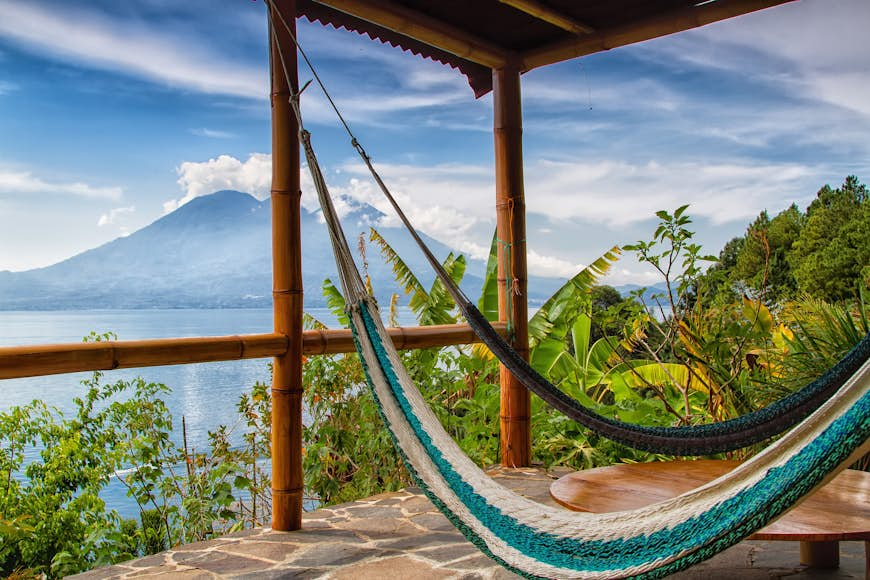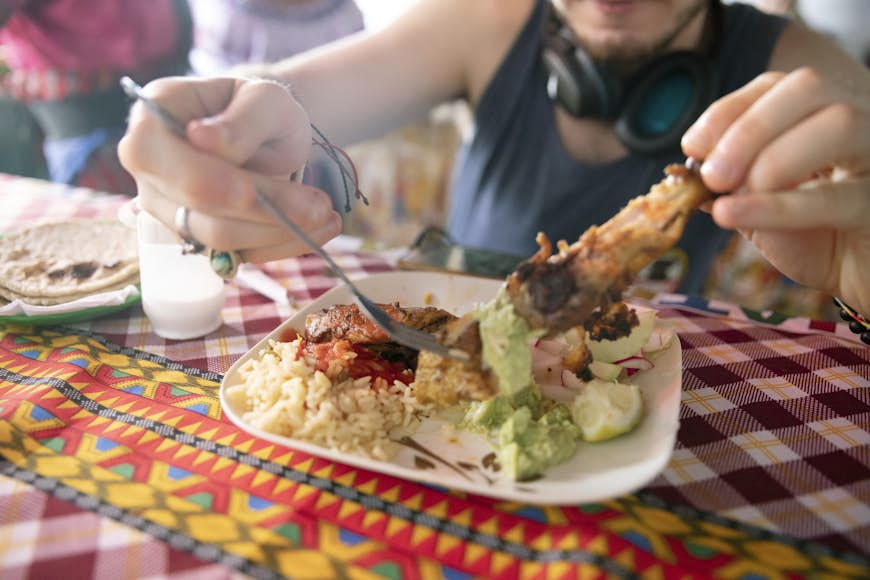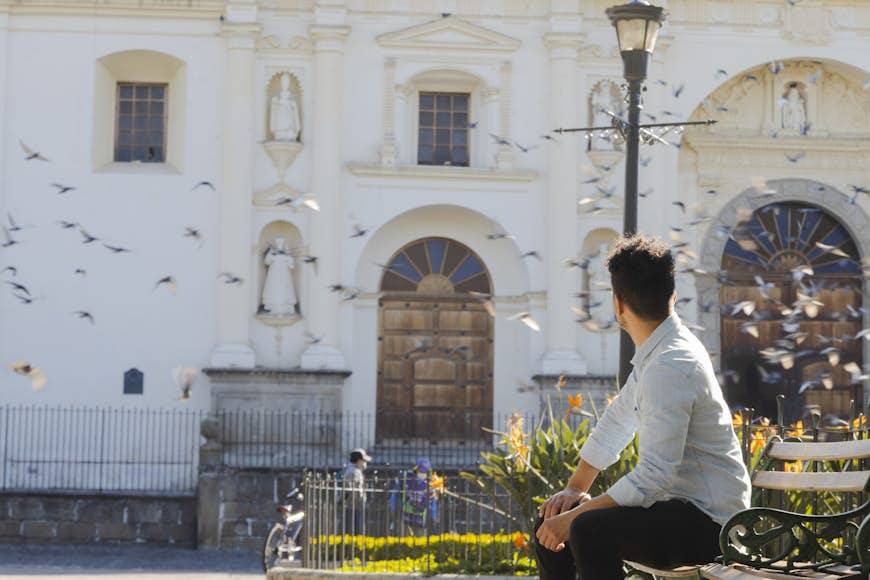Guatemala is an incredibly diverse country that offers some of the best natural attractions and hiking in the region. Luckily, it’s also a place where your money can go far, which is part of the reason why this lush, volcano-laden paradise is so popular on the backpacker trail.
Hostels are royalty in Guatemala, and you can find cheap stays that are as beautiful as any boutique hotel in many parts of the country: think jungle lodges with infinity pools or waking up right on the water’s edge of one of the most spectacular lakes in the world for as little as US$20 a night. Throw in tasty street food and beer that’s as almost as cheap as water and Guatemala can be so affordable that you may soon join the ranks of those who keep changing that return flight to stay just a little longer.
Here are the best ways to make your money last in Guatemala.
Flying is usually the cheapest way to get to Guatemala
Flying into Guatemala is generally the cheapest way to get there, and if you are coming from the US, there are regular deals for direct flights. Spirit Airlines is one of the most economical options, as long as you are aware of the hidden costs such as luggage and seat fees. If you’re traveling with just a carry-on bag, these cheaper flights are the way to go.
Take an airport shuttle instead of a taxi when you arrive
Unless you are traveling to Guatemala for business or volunteer work, chances are your first stop is going to be the beautiful colonial town of Antigua, just a 45-minute drive from the airport. Outside of arrivals, taxis wait to vie for your business. But the more economical and almost as easy option is the shared shuttle that leaves the airport hourly from 8am until 8pm every day. The ride costs US$20 per person, and it drops you off at your hotel. Shuttles leave from the same area where the taxis are.
It’s cheaper outside of Antigua and other tourist hot spots
While cultural hotspots like Antigua are not to be missed, spending more than a few days there can be a real setback to a carefully planned budget. Restaurants and accommodations cost significantly more than in a lakeside village such as San Pedro la Laguna. Farther afield, such as in the unassuming city of Quetzaltenango in the western highlands, prices dip even lower.
Hit up the local markets and pacas for cheap clothing
Need a replacement t-shirt or a few new pairs of underwear to keep you going until laundry day? Forget the department stores and head straight to the local market where you will find everything from nail clippers to batteries and new shoes and just about anything else in between, all at a fraction of the price you’d pay elsewhere.
Across Guatemala you’ll see pacas, small shops that people usually run out of their homes or as a small storefront selling cheaply priced second-hand clothing, most of which comes from the US. For serious thrifters, every major urban center has a Megapaca, a chain of large stores with endless aisles of previously loved clothing to sift through.

Travel with a tent, or rent a hammock for the night
Many hostels in Guatemala have designated areas for camping. Visitors can pay a small fee to use the hostel’s facilities and set up camp nearby. Some hostels, especially in the more tropical areas like the Pacific coast and the region around Tikal have hammocks available to rent and sleep in for around US$5 a night.
Visit from May to October and seek out on-the-spot deals
Guatemala’s slow season runs from May to October, when it rains most days but not all day. For those who don’t mind a bit of wet weather, the low season can be a wonderful time to visit Guatemala, and deals abound. Less demand for rooms means more flexible prices, and the best way to get them is by just showing up and asking. Many hostels are open to negotiating depending on how long you plan to stay and how empty the place is at the time.
Stay in hostels and take advantage of Guatemala’s many work exchange opportunities
Guatemala is well known for its beautiful hostels as well as an abundance of work exchanges. Many hostels, especially ones in the more touristy areas, welcome volunteers in exchange for food and board. This volunteer work can be found online, but many more opportunities can be found once you’re in the country.
Take the chicken bus instead of taxis or shuttles, if you dare
Chicken buses are old school buses from the US repurposed for public transport in Central America, and are by far the cheapest way to get around Guatemala. Decked out with bright colors, flashing lights, and booming sound systems, these buses are not for the faint of heart.
Operators like to pack in as many paying customers as humanly possible, and depending on the time of day and the route, a bus can get so full that literally every inch of space is taken up, leaving only very cramped standing room. If, however, you can score a window seat then the experience can be lovely, seeing the incredible landscape of Guatemala whiz by on your way to the next destination. For those who are up for the adventure, chicken buses run much more frequently than tourist shuttles and can actually get you to where you are going faster, due to what some might call reckless driving. It’s not safe to ride the chicken buses after dark, as thefts become more likely.

Eat street food and at comedors
In addition to being cheap and ubiquitous, street food can also be found at any time of the day or night, when restaurants have long since closed or are yet to open. Many of Guatemala’s cheap eats are also portable, such as corn on the cob, tamales (corn dough stuffed with seasoned meat or vegetables, wrapped in a banana leaf and steamed) and tortas (sandwiches made with crusty roll bread), making them the perfect snacks to pick up and take on an adventure or for a picnic-style lunch.
Anywhere you go in Guatemala there will be at least one tortilleria (tortilla shop). A stack of fresh corn tortillas costs less than US$1, and they are made from scratch every morning. Grab some avocados to go with them for nutrient dense vegetable fuel. Tortilleras generally close after noon. Small, simple restaurants called comedors are also economical options with many places serving up a menú del día (daily menu) for just a few dollars. This includes soup, a main meal of meat, rice, salad, tortillas and a refresco (a cold drink like lemonade or horchata).
Ask around for local guides and teachers
Guatemala has no shortage of activities, from hiking the tallest peak in Central America to kayaking the spectacular Lago de Atitlán and taking Spanish classes in Quetzaltenango. Many official tour companies and schools can be found online, but better prices can sometimes be found by word of mouth.
When you’ve reached your destination, ask around for local guides and teachers. In Quetzaltenango, for example, good Spanish teachers moonlight as private teachers outside of their official organization. In some places, foreign residents who know the hiking trails well go out in groups on the weekends. Check expat Facebook pages to see what’s happening.
A guide to daily costs in Guatemala
Basic room for two: US$30–60
Dorm bed in a hostel: US$10–20
Self-catering apartment (including Airbnb): from US$30
Chicken bus from Antigua to Lago de Atitlán: US$8
Cup of coffee: US$1.50
Sandwich: US$2–4
Dinner for two at a restaurant: $25–50
Beer/glass of wine at a bar: US$1–4
You might also like:
The 10 best beaches in Guatemala for quiet escapes, black-sand beaches and people watching
The 8 best hikes in Guatemala, from volcano trails to jungle jaunts
The best times to visit Guatemala for festivals, jungle encounters and temple trips
